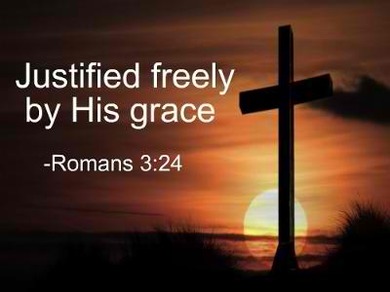
James 2:17, "Even so faith, if it has no works, is dead, being by itself."
James 2:26, "For just as the body without the spirit is dead, so also faith without works is dead."
Romans 3:24, "being justified as a gift by His grace through the redemption which is in Christ Jesus;"
Seemingly two opposing viewpoints...however, taken in proper context both have the same meaning.
James 2:26, "For just as the body without the spirit is dead, so also faith without works is dead."
Romans 3:24, "being justified as a gift by His grace through the redemption which is in Christ Jesus;"
Seemingly two opposing viewpoints...however, taken in proper context both have the same meaning.

Romans 3:28, "For we maintain that a man is justified by faith apart from works of the Law."
Romans 4:5, "But to the one who does not work, but believes in Him who justifies the ungodly, his faith is credited as righteousness," (speaking of Abraham)
Romans 9:32, Paul speaks of Israel's attempts to pursue righteousness through works. "Why? Because they did not pursue it by faith, but as though it were by works. They stumbled over the stumbling stone,"
Romans 4:5, "But to the one who does not work, but believes in Him who justifies the ungodly, his faith is credited as righteousness," (speaking of Abraham)
Romans 9:32, Paul speaks of Israel's attempts to pursue righteousness through works. "Why? Because they did not pursue it by faith, but as though it were by works. They stumbled over the stumbling stone,"

So it comes down to what James means by works. Let's look at the context of the verse. What is he saying in verses preceeding and following?
James' own use of the term 'works' is quite different from how we use it today. In James 2:19, James explains there is one God and that even demons can believe the basics of Christianity. He is expressing the difference between going through the motions with dead faith versus expressing living faith.
The purpose of James 2 is to communicate that faith without decision or response is dead faith.
James' own use of the term 'works' is quite different from how we use it today. In James 2:19, James explains there is one God and that even demons can believe the basics of Christianity. He is expressing the difference between going through the motions with dead faith versus expressing living faith.
The purpose of James 2 is to communicate that faith without decision or response is dead faith.

James uses two Old Testament examples, Rahab and Abraham, to explain justification by works. Both characters actively responded to God's will. They didn't sit back passively and claim that they believed in God. Rahab decided to open her door to the spies (Joshua 2:1), and Abraham chose to offer his son on the altar (Genesis 22:3).
It is important to note how many times Rahab opened the door and how many times Abraham hoisted his son Isaac on the altar. Once! Hence, works in this passage is really not about a lifelong record of good behavior.
It's actually about the importance of responding to truth - an act that goes beyond intellectual agreement.
James 2 can be summarized by the following thoughts:
- We're justified by works (but works needs to be defined in context).
- Works are like what Rahab and Abraham did.
- Living faith involves opening a door (of your life) - a work.
- Living faith involves offering someone (yourself) - a work.
- So living faith involves decision - a work.
- Any faith without decision is just dead faith.
It is important to note how many times Rahab opened the door and how many times Abraham hoisted his son Isaac on the altar. Once! Hence, works in this passage is really not about a lifelong record of good behavior.
It's actually about the importance of responding to truth - an act that goes beyond intellectual agreement.
James 2 can be summarized by the following thoughts:
- We're justified by works (but works needs to be defined in context).
- Works are like what Rahab and Abraham did.
- Living faith involves opening a door (of your life) - a work.
- Living faith involves offering someone (yourself) - a work.
- So living faith involves decision - a work.
- Any faith without decision is just dead faith.

Faith is about trusting God no matter what our desires or wishes are at the time. True faith brings about works from God as we rest in His perfect will. We will bear His abundant fruit through our rest in Him. In John 15:5, Jesus says, "I am the vine, you are the branches; he who abides in Me and I in him, he bears much fruit, for apart from Me you can do nothing."
When we try to do life on our own, our works become laborsome and a heavy burden. When God works through us, it is easy and light. Jesus says in Matthew 11:28-30, "Come to Me, all who are weary and heavy-laden, and I will give you rest. Take My yoke upon you and learn from Me, for I am gentle and humble in heart, and you will find rest for your souls. For my yoke is easy and My burden is light."
The author of Hebrews refers to dead works twice. Hebrews 6:1, "Therefore leaving the elementary teaching about the Christ, let us press on to maturity, not laying again a foundation of repentance from dead works and of faith toward God," and in Hebrews 9:14, "how much more will the blood of Christ, who through the eternal Spirit offered Himself without blemish to God, cleanse your conscience from dead works to serve the living God?"
Depending on our own efforts to deserve favor from God is considered 'dead works'.
Our sole responsibility as Christians is to rest (a spiritual rest) in Christ. When we get out of His way and allow His will to run our lives, life is easy. His works will abundantly flow from our rest in Him. Amen!
In Hebrews 4:3, the author states, "For we who have believed enter that rest, just as He has said,"
Hebrews 4:10, "For the one who has entered His rest has himself also rested from his works, as God did from His."
Once James 2 is seen in context it doesn't conflict with Romans or any other faith-centered passage. James 2 is not inviting us to introspect and assess our long-term track record of good works; in context, it appears to be contrasting dead faith (intellectual assertion only) with living faith (true conviction followed by decision).
Opening the door of your life to Christ and receiving the life of Christ will create His works to flow through you. They are God's works, not ours.
Paul tells us in Ephesians 2:10, "For we are His workmanship, created in Christ Jesus for good works, which God prepared beforehand so that we would walk in them."
We are justified by our faith in Him. It is that faith that reveals His works. So it is our faith in Him and His works in us that complete the picture of the description of James, Romans, Hebrews and others.
Paul says it well in Philippians 2:13, "For it is God who is at work in you, both to will and to work for His good pleasure." Amen!
Let Christ work through us as we rest in His abundant grace. :-)
When we try to do life on our own, our works become laborsome and a heavy burden. When God works through us, it is easy and light. Jesus says in Matthew 11:28-30, "Come to Me, all who are weary and heavy-laden, and I will give you rest. Take My yoke upon you and learn from Me, for I am gentle and humble in heart, and you will find rest for your souls. For my yoke is easy and My burden is light."
The author of Hebrews refers to dead works twice. Hebrews 6:1, "Therefore leaving the elementary teaching about the Christ, let us press on to maturity, not laying again a foundation of repentance from dead works and of faith toward God," and in Hebrews 9:14, "how much more will the blood of Christ, who through the eternal Spirit offered Himself without blemish to God, cleanse your conscience from dead works to serve the living God?"
Depending on our own efforts to deserve favor from God is considered 'dead works'.
Our sole responsibility as Christians is to rest (a spiritual rest) in Christ. When we get out of His way and allow His will to run our lives, life is easy. His works will abundantly flow from our rest in Him. Amen!
In Hebrews 4:3, the author states, "For we who have believed enter that rest, just as He has said,"
Hebrews 4:10, "For the one who has entered His rest has himself also rested from his works, as God did from His."
Once James 2 is seen in context it doesn't conflict with Romans or any other faith-centered passage. James 2 is not inviting us to introspect and assess our long-term track record of good works; in context, it appears to be contrasting dead faith (intellectual assertion only) with living faith (true conviction followed by decision).
Opening the door of your life to Christ and receiving the life of Christ will create His works to flow through you. They are God's works, not ours.
Paul tells us in Ephesians 2:10, "For we are His workmanship, created in Christ Jesus for good works, which God prepared beforehand so that we would walk in them."
We are justified by our faith in Him. It is that faith that reveals His works. So it is our faith in Him and His works in us that complete the picture of the description of James, Romans, Hebrews and others.
Paul says it well in Philippians 2:13, "For it is God who is at work in you, both to will and to work for His good pleasure." Amen!
Let Christ work through us as we rest in His abundant grace. :-)

 RSS Feed
RSS Feed